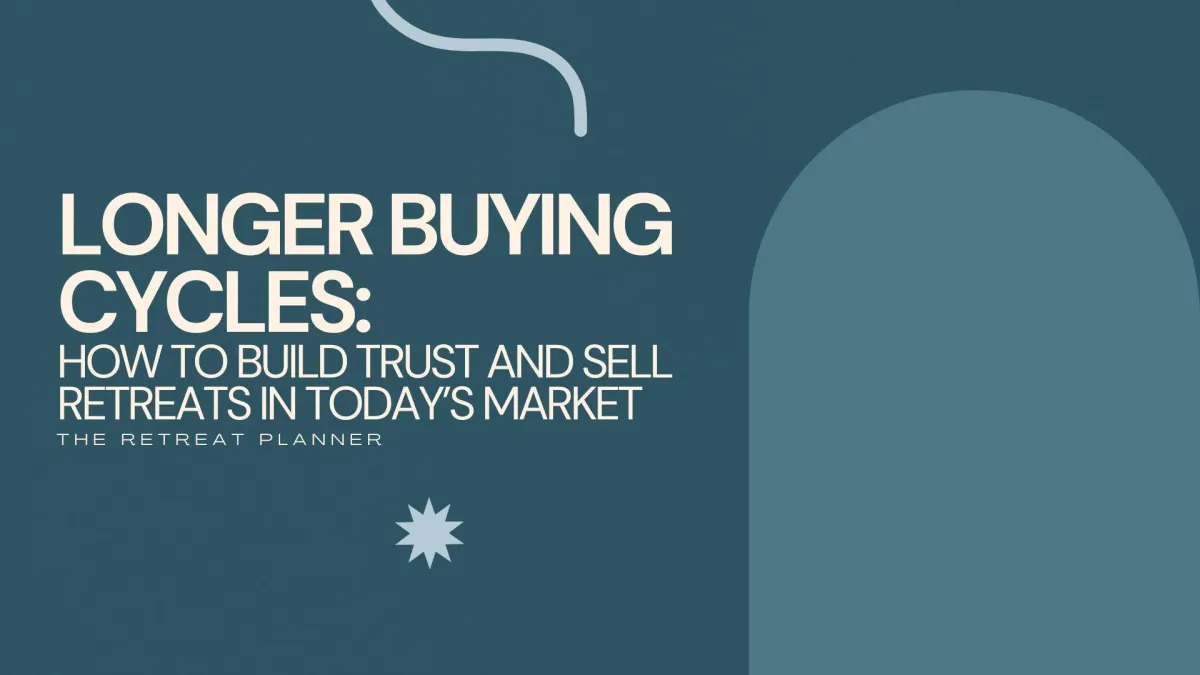How To Run Profitable Retreats Blog

Longer Buying Cycles: How to Build Trust and Sell Retreats in Today’s Market
“Longer Buying Cycles: How to Build Trust and Sell Retreats in Today’s Market"

In the evolving world of retreat sales, one thing is becoming increasingly clear: the buying cycle is getting longer. High-ticket experiences like retreats require a significant investment of both time and money, leading potential clients to spend more time researching, evaluating, and considering before they commit.
For retreat leaders, this shift means that building trust through consistent and meaningful touchpoints is more critical than ever. Let’s explore why buying cycles are lengthening, what this means for your retreat business, and how you can adapt to meet these new expectations.
Why Buying Cycles Are Longer Than Ever
Several factors contribute to longer decision-making timelines for retreat buyers:
Increased Competition: With more retreats and wellness offerings on the market, clients take extra time to compare options.
Financial Considerations: Economic uncertainties mean clients are more cautious about spending on high-ticket experiences.
Emphasis on Trust: Clients want to be sure their investment will deliver the promised transformation, making trust a non-negotiable factor.
Information Overload: With so much content available online, clients often spend weeks (or months) researching before making a decision.
What Longer Buying Cycles Mean for Retreat Sales
A longer buying cycle doesn’t mean potential clients aren’t interested—it simply means they need more time, information, and reassurance before they’re ready to commit. To adapt, retreat leaders must:
Be Patient: Understand that trust-building takes time and focus on nurturing relationships rather than rushing conversions.
Stay Consistent: Show up regularly across platforms to remain top-of-mind as clients move through their decision-making process.
Provide Value: Offer meaningful content and interactions that educate, inspire, and build confidence in your retreat offerings.
How to Build Trust Across a Longer Buying Cycle
Here are actionable strategies to navigate longer buying cycles and build lasting trust with potential retreat clients:
1. Map Out the Customer Journey
Identify each stage of the buying process, from awareness to decision-making, and tailor your content to address the specific needs of each stage.
Example: Create a sequence of emails or social media posts that introduces your retreat’s unique benefits, answers common questions, and shares testimonials.
2. Increase Touchpoints
Potential clients need multiple interactions with your brand before they feel ready to buy. Focus on creating consistent touchpoints across different platforms.
Example: Use a mix of email newsletters, Instagram posts, Facebook ads, and live Q&A sessions to engage your audience.
3. Share Transformational Stories
Testimonials and success stories help potential clients envision the value of your retreat. Highlight real experiences and results from past attendees.
Example: Share a video testimonial from a participant explaining how your retreat helped them achieve personal or professional growth.
4. Offer Free Value
Build trust by providing helpful, actionable resources that showcase your expertise and align with your retreat’s themes.
Example: Offer a free guided meditation, mini-workshop, or downloadable resource to introduce potential clients to your work.
5. Use Retargeting Ads
Retargeting ads ensure potential clients who’ve visited your website or engaged with your content see reminders of your retreat.
Example: Create ads featuring testimonials, countdowns to registration deadlines, or limited-time offers.
The Role of Follow-Ups
Follow-ups are essential in a longer buying cycle. Many potential clients won’t commit on the first interaction, but that doesn’t mean they’re not interested. Here’s how to follow up effectively:

Send Reminder Emails: Use automated sequences to remind potential clients about registration deadlines or early-bird discounts.
Check In Personally: For warm leads, a personalized email or message can make a big difference.
Provide Additional Resources: If a potential client expresses hesitation, share resources that address their concerns or highlight the retreat’s value.
Patience Pays Off
Navigating longer buying cycles requires patience and persistence, but the rewards are worth it. By focusing on trust-building and consistent engagement, you’ll:
Attract clients who are genuinely aligned with your retreat’s mission.
Foster long-term relationships that lead to repeat business and referrals.
Differentiate your retreat from competitors who rely solely on urgency-driven tactics.
Take the Next Step
Are you ready to adapt your sales strategy to meet the demands of today’s longer buying cycles? Let’s work together to create a plan that builds trust, engages your audience, and turns potential clients into committed retreat attendees.
With love,
Leni


